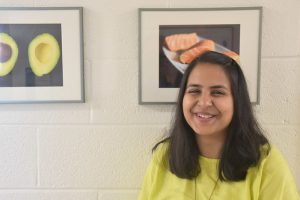Supporting Farmers, Businesses, Students and Communities

With positive vision and great ambition, Indu Upadhyaya joined UConn’s College of Agriculture, Health and Natural Resources in June 2019 as an Assistant Extension Food Safety Educator. Indu obtained her Bachelor of Veterinary Science and Animal Husbandry (equivalent to DVM) and a Master’s degree in Veterinary Biochemistry from Rajiv Gandhi Institute of Veterinary Education and Research in Pondicherry, India.
After working as a practicing veterinarian in India for a year, she joined UConn to pursue her PhD from the Department of Animal Science focusing on poultry microbiology and safety.
After completing her PhD, Indu moved to the University of Arkansas Center of Excellence for Poultry Science, Fayetteville, Arkansas as a postdoctoral associate, working in collaboration with the USDA-ARS Poultry Production and Product Safety Research Unit.
Before returning to UConn as a faculty member, Indu worked as an Assistant Professor in the School of Agriculture at Tennessee Tech University for one year, where she led a collaborative research program in poultry and fresh produce safety. She also taught two upper-level undergraduate courses in poultry science and facilitated several outreach activities and recruitment drives in Tennessee.
“As I approach completion of two years in my current role, I feel respected and valued in my department and in the college community.” Indu says. “The majority of my work so far has focused on training Connecticut’s growers and producers to comply with the Produce Safety Rule (PSR), a part of the FDA Food Safety Modernization Act (FSMA) that went into effect in 2016. I am also leading outreach efforts in several USDA, NE-SARE and CPS grants and look forward to contributing to them.”
Indu has conducted other trainings including Hazard Analysis Critical Control Points (HACCP) training for meat and poultry producers. These provide the framework for monitoring the total food system, from harvesting to consumption, to reduce the risk of foodborne illness.
Indu is working alongside extension educators in the Northeast to conduct successful trainings for producers and growers. Working closely with Diane Hirsch, an Emeritus Extension Educator for Food Safety, has made for a smooth transition. With 2020 throwing curveballs for many of us, it did not dampen UConn Extension training programs including Food Safety.
“We have successfully completed multiple farmer trainings using remote learning,” Indu says. “This includes the Produce Safety Alliance Grower training (three courses with 52 trainees) and a, three-day, Meat and Poultry HACCP training (17 participants). I have also continued farm visits during the pandemic following CDC guidelines. Various online platforms have helped me to serve the Connecticut community by remote consultation on various food safety and handling practices.”
Indu has been awarded a Hatch-Multistate Hatch grant as lead PI for mitigating the food safety risks associated with fresh produce production and is a co-PI on several USDA-NIFA, and Northeast Sustainable Agriculture and Research Education grants.
However, the biggest highlight for her in collaboration with UConn CAHNR colleagues, is a $10 million federal grant to improve sustainable poultry production globally. The USDA-NIFA funded project is developing an integrated and sustainable program for enhancing the viability of antibiotic-restricted broiler production in the poultry industry. The project launched in September of 2020 and focuses on a systems approach integrating bird health, human health, and environmental remediations to improve the sustainability of antibiotic restricted poultry production.
As a critical element in this grant, Indu is focusing on poultry outreach for both consumers and stakeholders to educate them on interventions and sustainable methods of production. She will conduct workshops, train-the-trainer programs and on-farm demonstrations to disseminate the results of the research objectives, so the stakeholders can implement more sustainable production practices.
“While our communities face ever evolving and serious challenges due to the ongoing pandemic, associated financial difficulties and health risks, I will continue to support farmers, small business owners, students and other members of the community through research, trainings and consultation in the state, region and nationally.”
Article by MacKenzie White